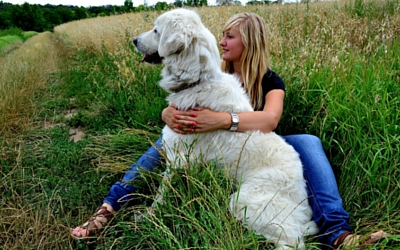
Sometimes, it’s easy to think that our dogs only tolerate us because we feed them, take them for walks and provide a warm comfy place to sleep. We love our dogs, often unconditionally, and are generally willing to do anything for them. But you sometimes have to wonder, do they really love us back?
Recently scientist have been looking deeper into how dogs show affection to their owners. Here are some of the ways that our canine companions let us know they really do love us right back (although not as much as food!).
They make eye contact. In the wild, eye contact can be seen as a form of aggression, so when your dog looks at you with those soft, wide ‘puppy dog eyes’, it is a loving gaze they are looking at you with.
They are happy to see you. Is there any better welcome home than your 4-legged friend bounding down the hallway to greet you, tail wagging? That excited greeting definitely means your pup is happy to see you!
They wags their tail. A dog’s tail wag can convey a multitude of feelings- from agitation and aggression, to happiness and excitement. When your dog is happy, he will hold his tail in a neutral or slightly raised position and adds a healthy wag, even a little hip wiggle if he’s really excited! The faster the wag, the more excited the dog.
They snuggle and sleep with you. Dogs are inherently pack animals, and in the wild, the pack would curl up together to sleep, both as a protective measure and for warmth. The fact that they like to snuggle up to you to sleep shows that they consider you part of their pack and thus, are protective of you.
They smile at you. A full-on doggie smile, corners of the mouth pulled back, showing just enough teeth to be charming but not frightening, can be totally disarming. This doggie facial expression actually conveys submission in the canine world, so giving you that doggie smile actually means that your dog accepts his subordinate position in the dog-human relationship or family.
They bring you presents. When your dog brings you his grubbiest chew toy, he is offering you his favorite belonging; this shows he thinks of you as his pack leader, and so offering up his most prized possession shows that he want to share this favorite things with the person he loves.
They follow you around. Sometimes it feels like you can’t take a step without tripping over your dog, or sit down without your pup crawling into your lap for a scratch. Take it as a compliment that your dog craves your attention and wants to be around you all the time.
They are calm when you leave. If you dog is calm as you leave, even retreating to their bed or favorite spot on the couch, don’t be offended. Well-adjusted pooches won’t bark and cry when your leave; those are signs of separation anxiety in dogs, not affection. If your dog loves you and trusts you, they will be confident that you will eventually return, so your departure is nothing for them to get upset over.
So if your dog does any of these things on a regular basis, rest assured that your affection for your furry friend is definitely returned!